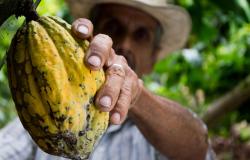
The EU Regulation on Deforestation-free Products (EUDR), which aims to minimize the contribution of the EU to global deforestation, is facing challenges in its implementation. One such challenge lies in applying the required due diligence provisions in producer countries such as Peru, where the impacts of the EUDR may be significant. Peru has a prominent tropical forest area and exports most of its cocoa and coffee to the EU, crops which are grown mainly by smallholder farming families and Indigenous communities. This study explores the ongoing implementation of the EUDR in Peru, through a case study in the country's cocoa and coffee sectors. Our results show that the process of implementing the EUDR involves complex challenges related to legality and due diligence, geolocation of plots, implementation costs, and country-risk benchmarking. Implementing the EUDR may also result in systemic changes in production practices and potentially prompt identifying possibilities to complement the EUDR through multistakeholder approaches and by providing opportunities to smallholders through agroforestry systems and carbon certifications. More generally, our study contributes to the timely debate on the EUDR and other due diligence regulations, by showing that the EUDR implementation process needs to ensure its enforcement at the local level in producer countries to enable its objectives and to strengthen international forest governance.
Policy implications
- The EUDR incorporates due diligence as a market obligation rather than a continuous process to improve human rights and environmental issues that occur on the ground. Therefore, its effectiveness depends mainly on the integration of relevant norms and policies, including their enforcement at the local level.
- The case study in the cocoa and coffee sectors of Peru shows that implementation challenges of the EUDR arise due to fragmentation in domestic policies and competent authorities, geolocalization of farms, implementation costs, country-risk benchmarking, gaps in specificity, a short timeline, and potential unintended effects (market distortions, migration into illegal activities, and exclusion of smallholders).
- Entry points to tackle these challenges can consist of strengthening governance in agricultural production areas, hardening sector collaboration schemes, scaling up deforestation-free and other related business models, and providing incentives to smallholders.
- These can be improved based on the existing and coordinated intervention of relevant public and private actors in the cocoa and coffee sectors, including the alignment of the EU cooperation and demand-side measures to accelerate the sustainability governance of these value chains and to halt global deforestation and forest degradation.
Photo by Pixabay